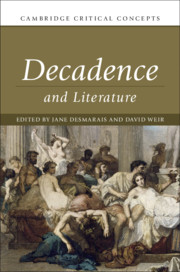Part II - Developments
Published online by Cambridge University Press: 12 August 2019
Summary
Notions of decadence, decline, and decay are intrinsically linked to the history of art. The discipline’s three recognized forefathers ? Giorgio Vasari, Johann Joachim Winckelmann, and Heinrich Wölfflin ? all relied on the concept of decadence (and its antonym, progress) to make sense of the history of the visual arts and to evaluate the art of their times. A developmental model of art was central to the interpretative schemes of these art historians. In this organicist model, earlier developments prepare the stage for what comes later; and after a particular style flourishes for a time, its decline is inevitable as newer styles overtake it. Decadent artists such as Gustave Moreau and Aubrey Beardsley mock aesthetic standards and moral rules, precluding universal appreciation, and proudly so. Decadent artists and decadent audiences are estranged from their society and feel disdain for those who are scandalized by decadent art’s innovative form and immoral subject matter.
Keywords
- Type
- Chapter
- Information
- Decadence and Literature , pp. 131 - 264Publisher: Cambridge University PressPrint publication year: 2019



